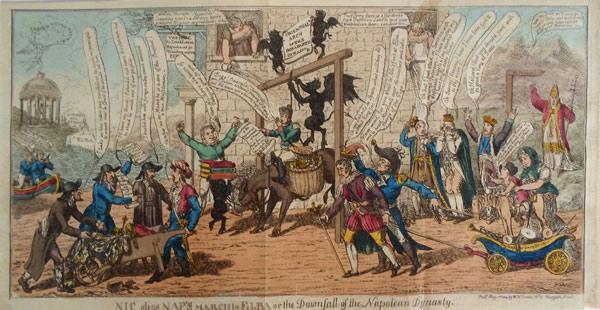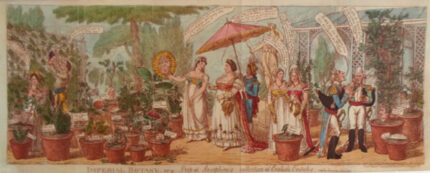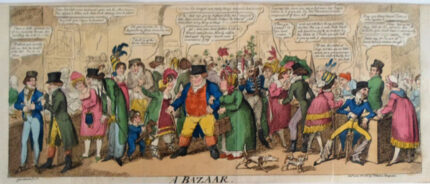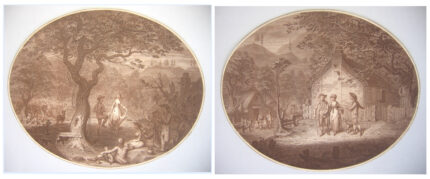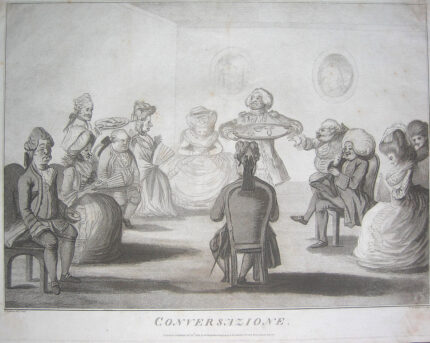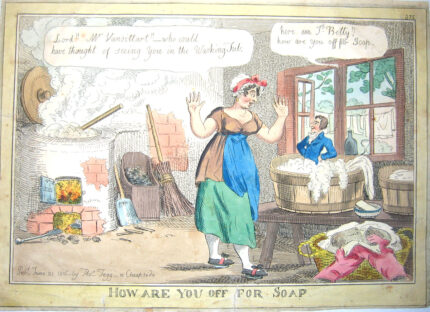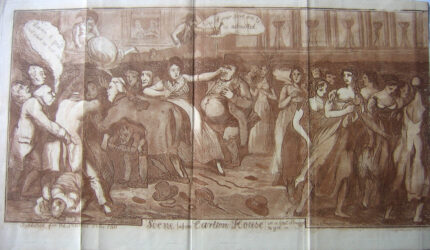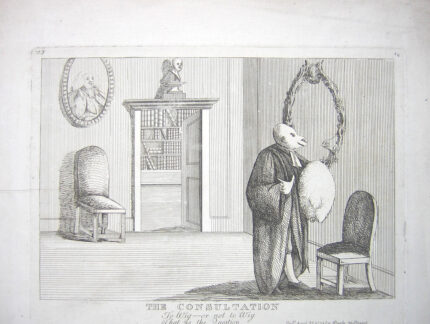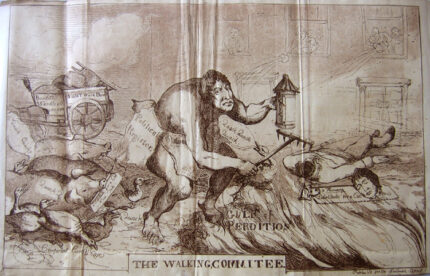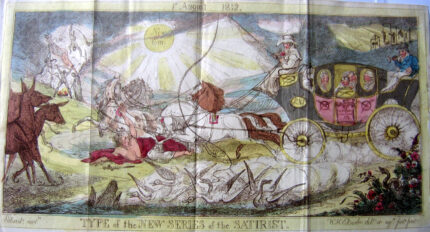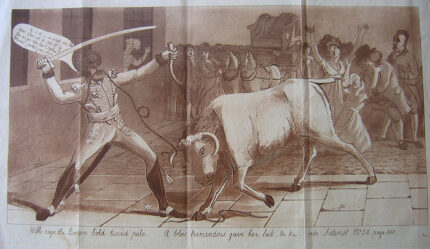Charles Williams
Nic alias Nap’s march to Elba or the downfall of the Napolean dynasty.
London, M. Jones May 1st. 1814, The Scourge
Etching
Original hand colouring
211 x 387 mm
Traces of old folds as issued
£380
A scene outside an inn whose side-wall, between sea (left) and mountains (right), forms a background to the centre of the design. Napoleon, wearing his petit chapeau and not caricatured, seated on a kicking mule, is stationary under a gallows, apparently unconscious of the Devil who stands behind him on the mule, one hoof resting on a box of ‘600,0000 Franks’ which is slung from the Emperor’s shoulder, in order to adjust a noose. Two similar but smaller demons, with webbed wings and barbed tails, stand on the cross-bar of the gallows displaying a placard: ‘Triumphal Arch Of The Bonararte [sic] Dynasty’. Napoleon sits between two panniers heaped with church plate; he reads a document: ‘Proclamation of the Provisional Government of France—Recals Louis XVIII to the throne Banisheth Nap to the Isle of Elba.’ He says, biting his thumb, "Dogs! Rascals! Turncoats! am I fallen without blowing up Paris— but I’ll leave yet a bloody page for history." A third little demon prances in front of the mule, which he is leading by a rein slung from his shoulder. On his head he carries three large volumes: ‘Alcoran’, ‘Sainte Bible’, and ‘Service of the Synagogue’, on which lies a mask. The innkeeper stands behind this demon, with both arms raised, gleefully holding out a basin to Napoleon; he says: "Here Nic! here’s a babason [sic] of Pichegrew gruel for you." There are two wide-open windows in the inn wall. From one (left) Josephine flings the contents of a chamber-pot at Napoleon, saying, "Wretch! Monster! Hypocrite!— Josephine [? helped] you to a throne here’s a reward for your ingratitude to her." From the other window Elisa Paterson pours a similar stream on the head of ex-King Jérôme who stands below, beside the (weeping) King of Saxony. She says: "Poor Jerry there is a few drops from Paterson Lake to cool your Westphalian fever—vive Louis XVIII." Both ladies are very full-bosomed and décolletées. Jérôme wears royal robes, and holds a sceptre in the hand he raises to steady his toppling crown. Over his left shoulder he holds a sack. He says: "Oh that I had staid in America with injured Paterson—I have driven my Westphalia hogs to a fine market however I have prig’d some Hams." Frederick Augustus also wears royal robes; his crown is upside-down. He covers his face with his hands and a handkerchief, his wrists being heavily chained, and says: "Oh Saxony! Saxony! how I have been Gull’d to thy ruin—." Behind them (right) stands Louis Bonaparte, wearing crown and royal robes, with both arms raised. He exclaims: "Oh Holland! that you should part with so good a King as I was—" In the foreground (right) is Joseph in Spanish dress. He uses a dilapidated imperial eagle as a walking-stick and drags an ornate go-cart, shallow and boat-shaped, inscribed ‘Playthings for Young Boney—April 1st 1814’. It contains drum, trumpet, sword, bayonet, crown, and sceptre. On these rests a wooden horse on low wheels which the King of Rome bestrides. He wears a little frock but has a profile and cocked hat resembling those of his father. The reins of the horse are pulled by an officer who is placing a fool’s cap and bells on Joseph’s head. The child flourishes a rattle, saying, "Colico [Caulain-court] you shan’t be Master of my Horse, you’ll pull me down I’ll anihilate you— as Papa says—." Marie Louise walks behind the child, holding him on the horse. She says: "Come my Dear we’ll take the road to Italy, and his holiness will give you better lessons than your Father did—." Joseph, much downcast, says: "Oh my Subjects in Spain, what will they do without King Joe!" Caulain-court answers: "Never mind Joe you shall be Nic’s fool at Elba—and be head Marshall over 160 coaches and take charge of the Pigs—." Behind Marie Louise and on the extreme left stands Pius VII in robes and tiara, his cross in his left hand. He points behind him towards a rugged mountain. A sign-post points (left) ‘To Italy’. In the left foreground a man in Turkish costume, probably Ali, cf. No. 12232, is pushing a wheelbarrow in which are a crown, sceptre, plate, a box of ‘Jewels’, and drapery dotted with bees. Three bearded Jews stand round the barrow, clamouring for payment. One holds out a paper: ‘Contract for Supplying the French Army in Russia with Provisions’, and says: "I’ll have my Bond! I should not have trusted him, but he shaid he wash one of our peoples." Another, with a ‘Contract for Supplying Bonapart with Forage in Russia’, says: "I trusted him with forage on the same account." The third (left) drags at the drapery in the wheelbarrow, saying, "I tinks we has better pay ourshelves he hash no principle he would sheet te Devil if he would let him." Ali says: "He a Jew! no no Moses he is a son of the Prophet! a true Mussleman." Behind (left) two men wearing peaked caps are pushing a boat to the shore. One says: "There he is Peter it seems we shall get rid of him"; the other answers: "To give the Devil his due he deserves our thanks." On the horizon (left) is a rocky spur of land on which is a temple. Two rocks are inscribed ‘Elba’ and ‘A Momento [sic] for Tyrants’. The temple, a dome supported on columns, is ‘Temple of In • Fame • y’. On the summit is poised a figure of Fame holding up a weathercock and blowing through her trumpet the words: ‘Be wise, O, Therefore Ye Kings’. On the frieze is the inscription ‘Dedicated to Napoleon’. Between the columns is seen a tiny statue of a man holding out a dagger in each hand. Each column has an inscription, the first is in shadow and obscure: ‘D’Enghien’ [?], ‘Murder’, ‘Deceit’, ‘Hipocracy’, ‘Opression’, ‘Rapine’. From the inn, facing Elba, a sign projects: ‘The H..E By Louis Loyal Refreshment for Travellers visting [sic] El[ba]’. To this a laurel branch is fixed with a favour: ‘Vive Louis.’

